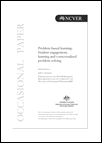Description
The adoption of problem-based learning as a teaching method in the advertising and public relations programs offered by the Business TAFE School at RMIT University is explored in this paper. The effect of problem-based learning on student engagement, student learning and contextualised problem-solving was investigated and it was found that students perceive problem-based learning to be beneficial. Several success factors for this approach are also identified. The research for this paper was undertaken by a novice researcher in the Community of Practice scholarship program, a program funded through the NCVER's Building Researcher Capacity initiative.Summary
About the research
Building the research capacity of the vocational education and training (VET) sector is a key concern for the National Centre for Vocational Education Research (NCVER). To assist with this objective, NCVER supports a Community of Practice scholarship program, whereby VET practitioners without any research experience are given the opportunity to undertake their own work-based research project. Scholarship recipients are supported by a mentor, and NCVER publishes their research results.
Mark Mossuto participated in the 2008 Community of Practice. Mark is a Senior Educator and Teaching and Learning Coordinator in the Business College at RMIT University. His research investigates the level of student engagement with problem-based learning, a teaching method where students learn through solving real-life situations or problems. RMIT University in Melbourne adopted this teaching approach for the advertising and public relations programs offered by the Business TAFE School in 2007 and 2008.
Through the use of a survey and interviews with students, this project sought to examine whether engagement, questioning, critical thinking and problem-solving skills are enhanced using the problem-based learning approach.
Key messages
- Overall, students reported that the problem-based learning approach was beneficial to their engagement with learning.
- The success factors integral to this approach include the quality of the teacher, the student’s willingness to participate, and industry support of the program.
The author also provides guidelines for assisting teachers adopting a problem-based learning approach and makes some suggestions on how problem-based learning can be used for the delivery of training packages.
Tom Karmel
Managing Director, NCVER
